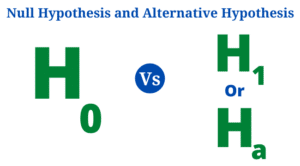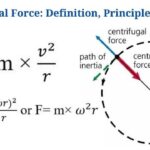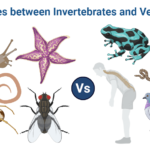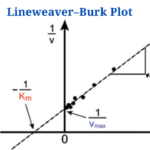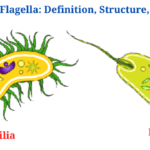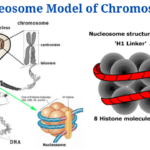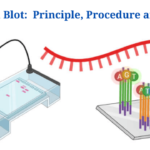Null Hypothesis Definition
The null hypothesis assumes that there is really no connection between the two events under examination or among two different groups
- A hypothesis is a statement that hasn’t been supported by adequate proof. As a result, null hypothesis is the notion that a researcher is attempting to refute a theory.
- A hypothesis which can be impartially verified, tested, and sometimes rejected is a null hypothesis.
- When a study is undertaken to evaluate technique A and method B in terms of their association, the null hypothesis is utilised, and the study is predicated on the concept that both approaches are extremely suitable.
- A particular null hypothesis, not one that proclaims or approximates a value, should really be used as the null hypothesis.
Symbol of Null hypothesis
- The null hypothesis is represented by the sign H0, which can be interpreted as H-null, H-zero, or H-naught.
- Because a null hypothesis can be accepted or else rejected, it is commonly coupled with just the ‘equals to’ sign.
Purpose of Null hypothesis
- A null hypothesis’ main objective is to either confirm or deny the statistical assumptions that’ve been proposed.
- The construction of a theory is aided by certain scientific null hypotheses.
- The null hypothesis is often utilised to guarantee that the outcomes of a number of investigations are comparable. The null hypothesis, for example, that there really is no association among patient age and treatment effectiveness, supports the overall efficiency result as well as permits recommendations.
Principle of Null hypothesis
- In an arbitrary model investigation, the null hypothesis’s principle is to collect data plus evaluate the odds of the gathered data, thereby proving that the null hypothesis is correct.
- When the data collected falls short of the null hypothesis’s expectations, it is determined that the data doesn’t give sufficient or consistent evidence to support the null hypothesis, and is thus rejected.
- Data is submitted to the test using a statistical tool that determines how far the data deviates from the null hypothesis.
- The technique checks that the observed deviation gained from the statistical tool is more than a predetermined value, ensuring that likelihood of a high departure value under the null hypothesis is extremely low.
- Yet, certain data possibly not really even disagree with the null hypothesis, implying that maybe shaky conclusion may be drawn and also that the data does not offer significant evidence to reject the null hypothesis, which might or might not be correct.
- The null hypothesis could be regarded as legitimate if indeed the data obtained is adequate as well as competent of giving sufficient proof, suggesting that there is no association among the phenomena.
When should a null hypothesis be rejected?
- The null hypothesis is rejected when the data’s p-value is lesser than the test’s significance level, indicating that the test results are important.
- The null hypothesis isn’t discarded if the p-value is higher than the significant value, and the outcomes are regarded insignificant.
- Degree of significance is important in hypothesis testing because it determines the probability of rejecting the null hypothesis when H0 is true.
- To put it another way, if the level of significance is set at 5%, the researcher is eager to accept a 5% risk of rejecting the null hypothesis (H0) if it is true.
- The null hypothesis can’t be adopted since a shortage of evidence just indicates that the association has not been established. It does not show that something does not exist; rather, it indicates that there are insufficient shards of proof and that the investigation may have overlooked it.
Null hypothesis Examples
Several instances of null hypotheses are as follows:
- If indeed the hypothesis is still that “taking a certain medicine lowers the possibility of a heart attack,” the null hypothesis is that “taking the medicine lowers the chance of a heart attack.”
- If “Does the score of one group differ from the other if random test scores are gathered from men and women?” is the hypothesis. One feasible null hypothesis is that men and women have the same mean test score.
H0 : µ1= µ2
H0= null hypothesis
µ1= mean score of men
µ2= mean score of women
Alternative Hypothesis Definition of
An assertion that there is an association among two selected variables in a study is known as an alternate hypothesis.
- In the vast majority of circumstances, an alternative hypothesis is utilised to argue that a new theory is superior to an old one (null hypothesis).
- Alternative hypothesis might basically be known as a counter-hypothesis to the null hypothesis.
- The alternative hypothesis is the hypothesis that should be demonstrated to prove that a study’s findings are significant and that the sample observation is due to a non-random source rather than chance.
- An alternate hypothesis is when a study is undertaken to compare technique A with method B in terms of their association, and we suppose that method A is superior or method B is inferior.
- Known the nature of the study challenge, substitute hypotheses must be articulated clearly.
Symbol of Alternate hypothesis:
By means of less than, larger than, or not equal marks, the alternative hypothesis is depicted by the symbols H1 or Ha
Purpose of Alternative hypothesis
- An alternative hypothesis offers precise restatements and explanations of the study challenge to the researchers.
- An alternative hypothesis gives the study a focus, which the researcher can then use to get the required outcomes.
- Since the alternative hypothesis is chosen prior to the investigation begins, the test can demonstrate that the study is evidence-based, divorcing it from the researchers’ wants plus values.
- Using an alternative hypothesis, you can discover new hypotheses which can be utilised to reject a current theory that’s not supported by proof.
- The alternative hypothesis is significant in establishing that the two variables chosen have a link and that the study’s findings are interesting and relevant.
Principle of Alternative hypothesis
- Both the null and alternate hypotheses are based on the same principle.
- The alternative hypothesis is founded on the idea that if more proof is gathered from an arbitrary sample of data, the researcher’s study hypothesis can be validated.
- Like the null hypothesis, the data from a randomly selected sample is passed through a statistical tool that analyses how far the data differs from the null hypothesis.
- The alternative hypothesis is accepted and the null hypothesis is rejected if the difference is modest enough under the selected level of statistical significance.
- An alternate hypothesis is true if the data obtained have no chance of appearing in the arbitrary sample study and are instead determined by the relationship inside the research sample.
Alternative Hypothesis Examples
Alternative hypotheses can be found in the following examples:
If a researcher assumes that a bridge’s bearing capacity is greater than 10 tonnes, the study’s hypothesis will be:
Null hypothesis H0: µ= 10 tons
Alternative hypothesis Ha: µ>10 tons
In a different study seeking to identify whether there is an important dissimilarity in the efficiency of medicine against heart arrest, the alternative hypothesis is that there is a link between the drug and the risk of heart arrest.
Difference between Null Hypothesis and Alternative Hypothesis
(Null Hypothesis Vs Alternative Hypothesis)
| Basis of comparison | Null hypothesis | Alternative hypothesis |
| Definition | The null hypothesis states that there is really no link between the two events under examination or among two groups. | A claim that there is an association between two variables in a study is known as an alternate hypothesis. |
| Symbol |
The symbol for null hypothesis is H0. |
The abbreviation for alternative hypothes is H1 or Ha. |
| Mathematical expression | The sign “equals to” appears after that. | The symbol “not equals to,” “less than,” or “greater than” is placed after it. |
| Observation | The null hypothesis states that the outcomes are completely random. |
The alternative hypothesis states that the observed outcomes are an outcome of real-world influences. |
| Nature |
The researcher is attempting to disprove this idea. |
The researcher is aiming to demonstrate the validity of a hypothesis. |
| Result | The outcome of the null hypothesis points out that no modifications in attitudes or behaviour have occurred. | Alternative hypotheses cause people to change their minds and their behaviour. |
| Significance of data | If the null hypothesis is adopted, the study’s findings happen to be irrelevant. |
If an alternate hypothesis is accepted, the study’s findings happen to be relevant. |
| Acceptance | The null hypothesis is accepted if indeed the p-value is greater than the level of significance. | An alternate hypothesis is accepted if the p-value is less than the significance threshold. |
| Importance |
The null hypothesis permits the approval of valid existing notions as well as the reliability of numerous investigations. |
Alternative hypotheses are significant because they connect two variables, result in new and better ideas. |
Click Here for Complete Biology Notes
Null Hypothesis and Alternative Hypothesis Citations
- https://www.statisticssolutions.com/null-hypothesis-and-alternative-hypothesis/
- https://keydifferences.com/difference-between-null-and-alternative-hypothesis.html
- https://en.wikipedia.org/wiki/Null_hypothesis
- https://keydifferences.com/difference-between-null-and-alternative-hypothesis.html
- https://byjus.com/maths/null-hypothesis/
- https://www.wisdomjobs.com/e-university/research-methodology-tutorial-355/procedure-for-hypothesis-testing-11525.html
- https://www.thoughtco.com/definition-of-null-hypothesis-and-examples-605436
- https://www.quora.com/What-are-the-different-types-of-hypothesis-and-what-are-some-examples-of-them
Related Posts
- Phylum Porifera: Classification, Characteristics, Examples
- Dissecting Microscope (Stereo Microscope) Definition, Principle, Uses, Parts
- Epithelial Tissue Vs Connective Tissue: Definition, 16+ Differences, Examples
- 29+ Differences Between Arteries and Veins
- 31+ Differences Between DNA and RNA (DNA vs RNA)
- Eukaryotic Cells: Definition, Parts, Structure, Examples
- Centrifugal Force: Definition, Principle, Formula, Examples
- Asexual Vs Sexual Reproduction: Overview, 18+ Differences, Examples
- Glandular Epithelium: Location, Structure, Functions, Examples
- 25+ Differences between Invertebrates and Vertebrates
- Lineweaver–Burk Plot
- Cilia and Flagella: Definition, Structure, Functions and Diagram
- P-value: Definition, Formula, Table and Calculation
- Nucleosome Model of Chromosome
- Northern Blot: Overview, Principle, Procedure and Results

